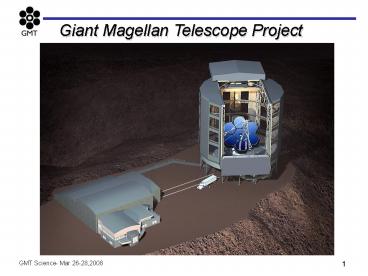Giant Magellan Telescope Project PowerPoint PPT Presentation
1 / 29
Title: Giant Magellan Telescope Project
1
Giant Magellan Telescope Project
2
GMT Partners
Astronomy Australia Limited Australian National
University Carnegie Institution of
Washington Harvard University Smithsonian
Institution Texas AM University U. of Arizona U.
of Texas at Austin Joining Korea Astronomy
Space Science Institute
3
Topics
- Telescope Concept
- Primary Mirror Fabrication
- GMT Site
- Enclosure
- Schedule
- Peter McGregors talk
- Adaptive Optics
- Instrumentation
4
GMT Science Case
- Planets and Their Formation
- Stellar Populations and Chemical Evolution
- Assembly of Galaxies
- Black Holes in the Universe
- The Accelerating Universe
- First Light and Reionization of the Universe
Science case www.gmto.org
5
GMT SCIENCE CONTEXT SYNERGY
Physical Diagnostics Deep/Wide Surveys High-resolu
tion imaging High SNR Res. Spectroscopy
JWST
ALMA
LSST
Magellan
SKA
6
Telescope Concept
Seven x 1.1m segmented secondary mirror (3.2 m F)
Alt-az mount
Seven x 8.4 m segmented borosilicate primary
mirror
Laser housing
Telescope stats Height 38.7 meters 1,125 metric
tons Lowest Mode 4.5 Hz (4.3 Hz with pier)
Pier
7
Operating modes
- Natural seeing operation
- 20 Wide-Field mode
- Multiple AO modes
- Laser Tomography AO (LTAO)
- Ground layer AO (GLAO)
- High contrast AO (ExAO)
- Future MCAO, MOAO
8
FAQ How Big Is It?
Full Diameter 25.4 m Circular aperture 22 m
Diffraction limit equivalent 24.5 m
9
Segmented Gregorian Secondary Mirrors
Fast-steering secondary (FSM) Seven 1.06 m
segments aligned with primary mirror
segments Tip-tilt translation actuators
Adaptive secondary (ASM) Technology developed
for MMT LBT 672 actuators per segment 4700
actuators total Capacitive position
sensors. In-telescope calibration source.
View from below
MMT 64 cm ASM
10
Gregorian Instrument Mounting
Large survey instruments mount below Intermediate
size AO instruments - always hot - above
11
Gregorian Instrument Rotator
Instrument platform (IP)
Hydrostatic bearings (6)
C-rings K-bracing
Oil trough
Lift platform (not shown)
12
8.4 m Primary Mirror Segments
Off-axis, highly aspheric require the development
of new casting/generating/polishing
techniques Metrology challenge Provide multiple
independent surface figure verification
tests Each mirror takes 3.5 years Production
pipeline to produce a mirror every 10-12 months
Pacing item for GMT completion Prototype
off-axis segment to retire technical schedule
risk
13
Steward Observatory Mirror Lab (SOML)
14
GMT1 casting
May 2005
Jun 2005
Nov 2005
Jul 2005
15
Processing stages
- Pipeline processing
- Casting
- Clean-out
- Rear surface processing
- Generating
- Grind polish
- Loadspreader attachment
- Front surface processing
- Generating
- Grind polish
- Final figuring
Mar 2006
16
SOML Polishing Lab
LOG
Test tower
LPM
Stressed lap
17
Optical Testing
- Metrology is the greatest challenge
- High degree of aspheric departure 14 mm
- Requirement that segments match to high accuracy
- ?Rc lt 0.3 mm (0.0006)
- Repeatability over 10 years of production
- Use compensators to relax tolerances
- Principal test full aperture, nulling
interferometer - In-process testing during polishing
- Verification Tests
- Laser tracker Plus test- pre-polish generation
independent low-order figure verification - Scanning pentaprism- final low-order figure
verification - Shear test- high frequency errors
18
New Test Tower
23.5 m vertex to vertex
19
M1 Fold sphere GMT1
GMT1 Completion April 2009
GMT1
3.8 m Fold sphere
Jan 2008
20
Las Campanas Observatory
21
Sites
22
Site Monitoring Equipment
IRMA
DIMM
Vantage Pro
MASS/DIMM
23
Seeing Percentiles- LCO sites
Use nights suitable for observing and on which
all DIMMS were operating and operators were on
site. Reporting period November 12, 2005
through November 19, 2007 covering all
seasons. Total nights/samples 323/82K
24
Las Campanas Peak- east view
Road access Water Power Communications
25
GMT Facility on Campanas Peak
Enclosure
Control Building (Below)
Equipment Building
Prevailing winds
Facility Building
Auxiliary Building
26
(No Transcript)
27
(No Transcript)
28
www.gmto.org
29
Low-altitude Atmospheric Turbulence
SLODAR on LCO DuPont Telescope (ANU)
Lunar Scintillation LuSci Prototype CTIO
(Tokovinin, et. al)
Campaigns September 2007 January 2008.

